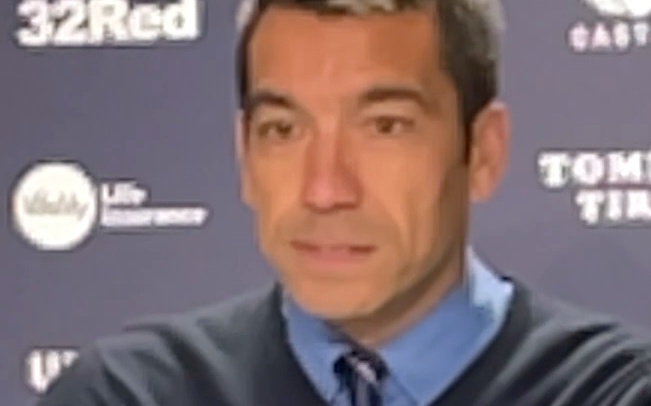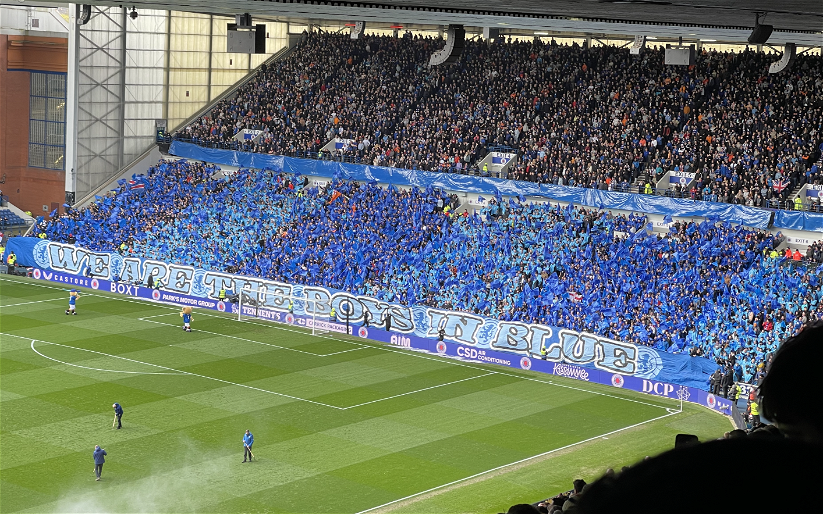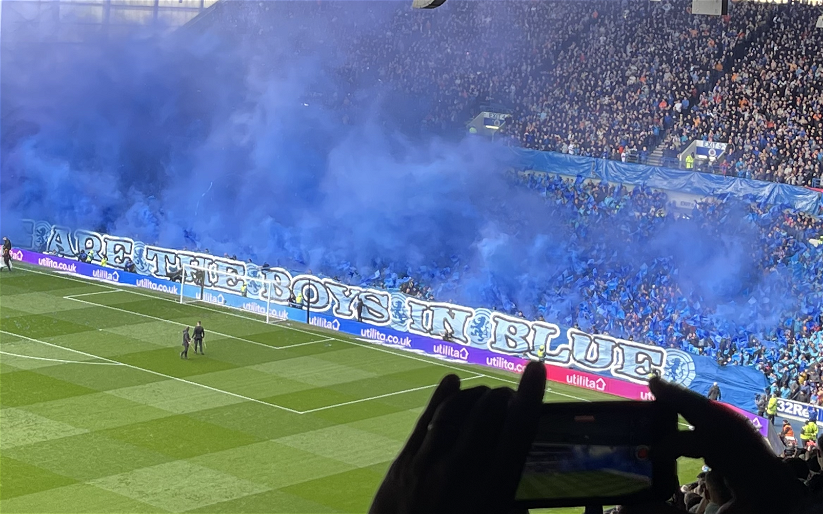By Alistair Aird
On 5 May 2022, Giovanni van Bronckhorst became part of a band that has only three other members, namely Scot Symon, Willie Waddell and Walter Smith. The common thread that runs through the managerial tenures of that quartet is that they are the only ones in our 150-year history to guide us to the Final of a major European competition. Symon did it twice, in 1961 and 1967, Waddell had us bound for Barcelona in 1972, while Walter had Manchester bracing itself for our arrival in 2008. And when John Lundstram sealed the deal against RB Leipzig, van Bronckhorst had us setting our sights on Seville.
At the press conference held at the Training Centre on Thursday, Gio recalled his first European match in charge – the 2-0 win over Sparta Prague at Ibrox – and said that no one at that stage thought we would make the Final. He wasn’t wrong. The unwavering focus at that point was on the quest for 56. Progress in Europe, as is the norm, was viewed as being a bonus.
But something changed after Rangers saw off Borussia Dortmund. Not many teams score four goals in their backyard, but we did. Suddenly we had a shot at glory at Ibrox, the chance to eliminate one of the tournament favourites. And thanks to a tactical masterclass from van Bronckhorst we did just that.
His reversion to a back three at the start of the second half was a season-defining moment, a strategic manoeuvre that swung the tie back in our favour. We got to see the versatility of John Lundstram, and we also witnessed that the manager wasn’t rigid when it came to formation. His flexibility since then has also been key to the successes that have followed against Red Star Belgrade, SC Braga and RB Leipzig.
But tactical changes aren’t a new thing for van Bronckhorst, he’s been adapting the shape of his team ever since his first European match as a manager. That was a 1-0 win over Manchester United in Rotterdam in which he adopted a 4-2-3-1 formation. He stuck with that for the five Group A matches that followed, but when he got his first taste of Champions League football as a manager the following season, he tweaked his system albeit with limited success. In the matches against Manchester City, Napoli and Shaktar Donetsk he switched between a defensive 4-3-3 and an attacking 4-3-3 and went 4-1-4-1 in the 2-1 home defeat against Napoli. Five of the six group stage matches were lost.
A loss to AS Trencin in the Europa League qualifiers in season 2018/19 left a bitter aftertaste for van Bronckhorst. His Feyenoord side lost 4-0 in Slovakia in the first leg and could only draw 1-1 at de Kuip in the return leg. But this like the chastening experience in the previous season’s Champions League was all part of van Bronckhorst’s ascent up the managerial learning curve. And that rise has been meteoric this season.
For his European bow as the Rangers manager, van Bronckhorst opted to play 4-2-3-1. Europa League talisman, Alfredo Morelos, was the focal point, with Kent, Aribo and Hagi in the three behind him. Steven Davis and Glen Kamara were the holding midfielders, while Tavernier, Goldson, Bassey and Barisic – the back four that is likely to start the Final in Seville – stood in front of Allan McGregor.
What we witnessed in this match was something that has been synonymous with performances at Ibrox in Europe since van Bronckhorst took over, high intensity, a high press and a relentlessness in our attacking play. It was an approach that reaped a rich reward that night, a Morelos brace enough to see us through to the play-off round as runners-up in Group A.
In the play-off round against Dortmund, it was 4-2-3-1 again. Lundstram, Jack and Arfield were the only changes in personnel from the Sparta game, but that didn’t disrupt the rhythm. And the upshot was arguably the finest away victory Rangers have registered in European competition.
I don’t think even at that point we were thinking of Seville. And when Donyell Malen reduced Rangers’ aggregate lead to 5-4 three minutes before half time at Ibrox, those present may well have been contemplating an uncomfortable and tense 45 minutes in the second half. But van Bronckhorst had other ideas.
He had seemed resistant to change in the games he had taken charge of up to that point. He had a core of players that he had called upon for all matches at home and abroad. Squad rotation didn’t appear to be his thing. But when he brought on Leon Balogun for Borna Barisic at half time against Dortmund, he demonstrated that he could make key alterations in game, and he was about to emphatically answer many of the doubters that had been voicing their displeasure since the meek surrender at Parkhead a few weeks earlier.
Most suspected the change would see Calvin Bassey move to left back, with Balogun slotting in alongside Goldson in the centre of the defence. Bassey did indeed move out to the left, but as the players set up for kick off, we saw John Lundstram join Balogun and Goldson in a back three. What was the manager doing? We were expecting a second half onslaught, yet Gio was pitching a holding midfielder whom the fans still weren’t convinced about into the heart of the defence. By the time the match was over, though, we were effusive in our praise and were lauding the manager for the move. Rangers were superb in the second half and would have been victorious on the night but for a scandalous decision from VAR.
With the tournament favourites duly despatched, Gio reverted to 4-2-3-1 as Rangers built a commanding 3-0 lead against Red Star Belgrade in the last 16. But there was another masterstroke selection that night too.
Glen Kamara had found game time limited primarily due to the excellent form of Lundstram and Ryan Jack. But Gio brought him back into the XI for this one, but he wasn’t deployed as a holding midfielder. He was part of the three behind Morelos, essentially playing in the number 10 role. It was a move that no one in the stadium foresaw, but it was another feather in manager’s cap as Kamara was extremely effective in what was an emphatic win.
We then witnessed a couple of dour and stoic defensive displays away from home against Braga and Leipzig, but boy did we make up for that when both came to Ibrox. There was ruthlessness about our play, and once again there was in game changes in formation. Against Braga we went from 4-2-3-1 to 3-5-2 at times, but in my opinion, it was the home match against RB Leipzig that showcased what Giovanni van Bronckhorst can offer as a manager and a tactician.
In recognition of the talented group of players we were facing, Gio started this one with a back three in a 3-4-2-1 formation, but shorn of Morelos and Roofe, his decision to play Joe Aribo as the false nine in addition to asking for fluidity from Kent and Wright in the forward areas must rank alongside the best decisions he has made in his tenure at Ibrox. On a night when the fans created arguably Ibrox Stadium’s greatest ever atmosphere, the players carried out the manager’s gameplan superbly. Kamara was once again a key component – manufacturing an opening for Kent to burst forward and create the first goal before coolly netting the second himself – but we were once again purring about what van Bronckhorst had done tactically. Aside from a 10 or 15-minute spell his approach nullified the Germans, and for just the fifth time in their history, Rangers were in the Final of a major European competition.
Gio now has one more blueprint to draw up, one that he hopes will elevate him and his players to legendary status. His budget is dwarfed by that of all the majority of sides Rangers have faced thus far, and although they occupy a lower position in the Bundesliga than Dortmund and RB Leipzig, Eintracht Frankfurt are another that fall into that category. But van Bronckhorst doesn’t see that as a barrier. He believes that whoever he calls upon on Wednesday they will be flexible and dexterous such that they can effectively execute the gameplan.
After Dortmund we dared to dream. Next Wednesday that dream may well become reality. Immortality beckons for the manager and his players as the quest for Europa League glory continues.




